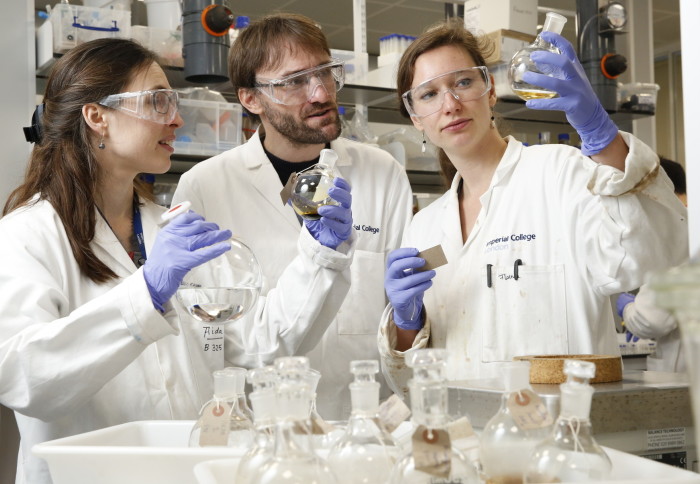Imperial projects shortlisted for prestigious IChemE Global Awards
by Sara West

Co-founders of Lixea Limited, finalists in the Business Start-Up category
Imperial projects have been named as finalists in several categories of the annual IChemE awards.
The Institution of Chemical Engineers (IChemE) Global Awards celebrate excellence in chemical, process and biochemical and are considered the world’s most prestigious chemical engineering awards.
This year Imperial has finalists placed in the categories of Energy, Business Start-Up, Public Engagement, Research Project, Team, and Training and Development. Winners will be announced in November during a series of webinars.
Sustainable materials production
Finalist in Business Start-Up Category

Co-founded by Dr Agi Brandt-Talbot (Chemistry), Dr Florence Gschwend (Chemical Engineering) and Professor Jason Hallett (Chemical Engineering), Lixea Limited (formerly Chrysalix Technologies) has commercialised a process which enables wood waste to be used for the production of renewable chemicals, materials and fuels. Lixea has developed a low-cost ionic liquid to enable to large-scale production of bio-derived materials, paving the way for a greener alternative to the petrochemical industry.
The company has previously been recognised with funding from the Royal Academy of Engineering Enterprise Fellowship and the European Union’s Horizon 2020 Research and Innovation programme.
Leaders in methane emissions reduction
Finalist in Training and Development category

The Methane Guiding Principles (MGP) Global Outreach Programme aims to develop leadership in methane emissions reduction in oil and gas supply chains worldwide. It sets out the business case for reducing methane emissions, communicates understanding on sources, magnitude, and identification/quantification methods for methane emissions, and presents the MGP Reducing Methane Emissions Best Practices alongside real-world case studies.
The Methane Guiding Principles Global Outreach Programme is designed to give the natural gas supply chain the knowledge and tools needed to provide an effective response on reducing emissions and helping to mitigate climate change. It covers a diverse set of issues from the technical aspects of leak detection and repair through to continual improvement of methane management. Methane is a potent greenhouse gas, so the more we can do to understand emissions and reduce them, the better.
Off-grid refrigeration technologies
Finalist in Energy Category

Solar Polar is developing solar-powered cooling systems for developing countries in partnership with the Clean Energy Processes Lab in the Department of Chemical Engineering. The company is producing off-grid air conditioning and refrigeration for areas where high temperatures and cooling demands put pressure on the electrical grid, if residents have access to electricity at all. The technology will also reduce food waste in areas where food spoils quickly due to the temperature.
The Imperial finalists are as follows:
- Business Start-Up: Lixea Limited
- Energy: Imperial College London and Solar Polar, Net-zero Emission Decentralised Cooling System
- Public Engagement: Imperial College London as part of The DISTINCTIVE Consortium
- Research Project: Imperial College London, and Solar Polar, Net-zero Emission Decentralised Cooling System
- Team: Imperial College London and Sipsmith, CE Imperial Lather
- Training and Development: Imperial College London, Methane Guiding Principles Global Outreach Programme
Visit the IChemE website to see the full list of finalists.
Article text (excluding photos or graphics) © Imperial College London.
Photos and graphics subject to third party copyright used with permission or © Imperial College London.
Reporter
Sara West
Communications Division